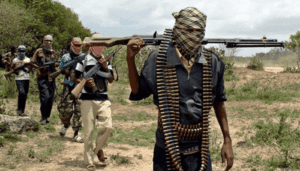
Violence is too costly for Nigeria: Concerted efforts from all now sacrosanct
The disposition of Nigerian authorities to violence apparently reflect the Government may be oblivion of its cost in the Country. Recently, the narratives of violence in various forms have set to put before the Country reflections of anarchy and impunity of illegal use of force. In its various forms, violence has largely held the Country to ransom with far reaching impacts which have left the Country with clusters of unsavoury conditions.
The wild wave of these ills in their effects appear to be more stormy from particular ends, and its cost with subtle impacts, a condition that may be linked to why the apparent care-free disposition on the part of the Government has been perceivable and to certain extent, other fabrics of the society standing passive to the threats.
Be it on the scale of the evident losses and the subtle impacts, the evident damages of violence have indisputably inflicted debilitating blows on the Country’s societal fabric with huge cost. It is indisputable that the entire fabric of the Country have had to suffer directly and/or indirectly from the clusters of violent aggression in whatever form they appear. From the domestic enclave to terrorism front, violence is undesirable and has been costly on Nigeria.
The Institute of Economics and Peace (IEP) on Wednesday, 31st August 2022, disclosed that violence affected about eight per cent of Nigeria’s Gross Domestic Product (GDP) leading to the country losing about N50 trillion within 18 months. IEP in its 2021-2022 report (January 2021 to June 2022), tagged “Nigeria Security Analysis Report” followed a research organised by Nextier SPD, which considered violence and its attendant effects on the Nigerian economy. Nextier has maintained a robust database of violent conflicts in Nigeria in recent years. The Database tracks violent conflicts such as banditry, terrorism, extra-judicial killings, farmer-herder incidents, armed robbery, cultism, piracy, secession agitation, and communal clashes. The Nextier Violent Conflict Database is aimed at providing detailed insights into violent conflicts in Nigeria for research, policy advocacy, development and security.
In the report presented in Abuja, it was alleged that the Nigerian government spent about N8trillion on security without achieving the desired results. It stated that the increase of violence left state governors apparently overwhelmed as they were restricted by the constitution from taking certain measures in combating insecurity in their respective States. According to IEP, “Nigeria lost about N50.38 trillion to growing violence in 2021. The Nigerian government has spent at least N8 trillion on security provisions without achieving the desired results. Many governors have stated in different fora, that they are not the chief security officers in their states.”
It explained that the report was based on analyses carried out on violence activities across the Country, including secession agitations in the south, bandits attacks on vulnerable villages in Northwest and North central Nigeria, with incidences of village raids, sexual violence, ransom kidnapping, cultism, killings, and large-scale livestock which has affected the livelihoods of about 21 million people in Kaduna, Katsina, Kebbi, Niger, Sokoto, and Zamfara states.
It stated that, “banditry in the Northwest and North central regions transitioned from raids on vulnerable communities to large-scale ransom kidnapping of school students and brazen attacks on targets, including military installations. Sometimes, bandits send Ietters of impending attacks and extort levies from terrified communities.”
According to the report, a key feature of contemporary armed conflicts is that civilians have become combatants and primary victims, noting that in Nigeria, villages, streets, and schools have become battlefields, which eventually resulted to self-help and group-level armed defence systems responsible for increased secure violent hotspots.
“From the North to the South, activities of armed men have led to bloody shootouts, protracting crises, and complicated security situations. In many rural communities in Nigeria, violent conflicts limit access to farmlands and disrupt livelihood sources. Due to this challenge, food insecurity across Nigeria looms rural areas.
“Also, cities are not left out. Research shows that rural-urban migration may contribute to social and economic problems, including urban insecurity. It pointed out that despite the decrease in terror-related deaths, Nigeria recorded the ninth highest number of persons killed by terrorist incidents worldwide in 2022 due to recurrent crisis in 2022, which include banditry, terrorism, cultism, extrajudicial killings, farmer-herder struggle and secessionism,” the report stated.
It said in the wake of these violences and despite security responses, banditry incidents and fatalities have continued to heighten aided by security personnel. “Bandits are rampaging vulnerable villages in Northwest and North central Nigeria. Tracked activities by bandits include village raids, sexual violence, ransom kidnapping, killings, and large-scale livestock rustling, said the report, citing the recurrent violence affects livelihoods.
“The secessionist agitations in Nigeria raise serious concerns and have continuously thrown the nation into a state of instability and disintegration. At the very least, a significant amount of resources and lives have been lost during these agitations. Escalating violence in the South East is hampering economic progress and social order,” the report read.
According to a report, every time there is a sit-at-home, the Southeast geopolitical zone loses about N10 billion Naira.
“Cities like Onitsha, Aba, and Nnewi are core manufacturing and commercial hubs that are negatively impacted by the insecurity in the region. Manufacturing accounts for 31% and 30% of businesses in Aba and Onitsha. These commercial centres are also export routes to Central and West African nations.
“Violence is a drawback to education in the region. While pupils, students, and teachers in various parts of the country attend school, their southeast counterparts do not attend school on Mondays to avoid the wrath of overzealous members of the Indigenous People of Biafra (IPOB). Additionally, insecurity has displaced many farming communities and hindered cultivation. This situation has deterred agricultural supply and increased the cost of agricultural goods.
“Nationally, the cost of essentials like beans and tomatoes has increased by 253 per cent and 123 per cent, respectively, since July 2020. A measure of beans (known as Mudu) cost 73 cents (N305.48) in July 2020, but by July 2021, it was going for $2.16. (N900). Other goods, including bread, onions, and cassava flour, have increased exponentially,” the report noted.
Away from the forefront of terror based aggression, the violence within domestic circles appear to bear deep records with far reaching impacts. Issues of emotional trauma and imbalance, depression and other psychological defects are known to be associated with the various forms of domestic violence related offences. The rising records of these forms of violence, pose real threats which demand for critical attention. Wednesday 31, August 2021, it was disclosed no less than 4,860 cases of domestic violence, rape, sexual assaults and other related offences were recorded by the Lagos State Government (LASG) in the last 10 months. The State’s Attorney General and Commissioner for Justice, Moyosore Onigbanjo who made the disclosure at a news conference commemorating the Domestic and Sexual Violence Awareness Month, September, 2022, said the figures covered the period between September 1, 2021 and July 31, 2022. Giving a breakdown, Onigbanjo said there were 2,029 domestic violence cases, 65 rape cases, 40 sexual assault cases, 10 attempt to commit rape, five sexual assaults by penetration, 73 threat to life and 488 others, such as separation, neglect, among others. Others included 113 child abuse/physical assault, 194 defilement cases, 15 defilement/molestation by minor to minor, 105 child labour, abduction neglect and 145 sexual harassment/molestation cases. The Attorney General added that a total of 1,578 children had experienced emotional abuse, explaining that 55 percent of these children had been taken through counselling programmes to ensure they were able to psychologically deal with the events they had witnessed without it having a permanent and negative impact on them. He further revealed that the youngest child that experienced sexual violence in the year under review was eight months, while the oldest clients that experienced domestic violence were 75-year-old woman and 89-year-old man.
“We have also witnessed an increase in reporting of cases from other States; mostly from Ogun, Abia, Anambra and others respectively. In the past 11 months, a total of 394 cases occurred outside Lagos. Such cases are promptly referred to the relevant agencies in their respective States. The Office of the Public Defender as well as the Lagos Public Interest Law Partnership (LPILP) has provided free legal representation to 110 survivors of Domestic Violence, ranging from Judicial Separation, Divorce, Maintenance, Custody of children and Settlement. All the survivors of sexual assault received medical attention from Comprehensive Primary Health Care Centres, General Hospitals and Sexual Assault Referral Centres like Mirabel Centre, Women at Risk International Foundation (WARIF) as well as Idera Centre,” he said.
The need to fight the disturbing scourge of violence in the Country headlong is pertinent. Such fight must be comprehensive and overarching. Hence, to make the fight meaningfully driven, all well intentioned citizens, organs and institutions must rise to the challenge. While the Government has the monopoly of the control of the security forces in the Country, a function which situations now demand it becomes alive to, the Government cannot be left to it alone. Leaving the Government to fight solely would only amount to frustration. Hence, the fight to quell the prevailing raging storm of violence in the Country must be concertedly prosecuted by all, as every right thinking person and well intentioned institution of the society has their distinct and definite role to play.
For the Government, the primary role of enforcing law and order is a duty call it must awake to fulfill without option, while other institutions including the religious, cultural, traditional, social, political, among other organised bodies, including the media, civil society groups, among others have their roles to play to blend, where applicable, and complement, where necessary, measures to enforce social sanity and bring the society to the ambience of tranquillity for peaceful coexistence.



